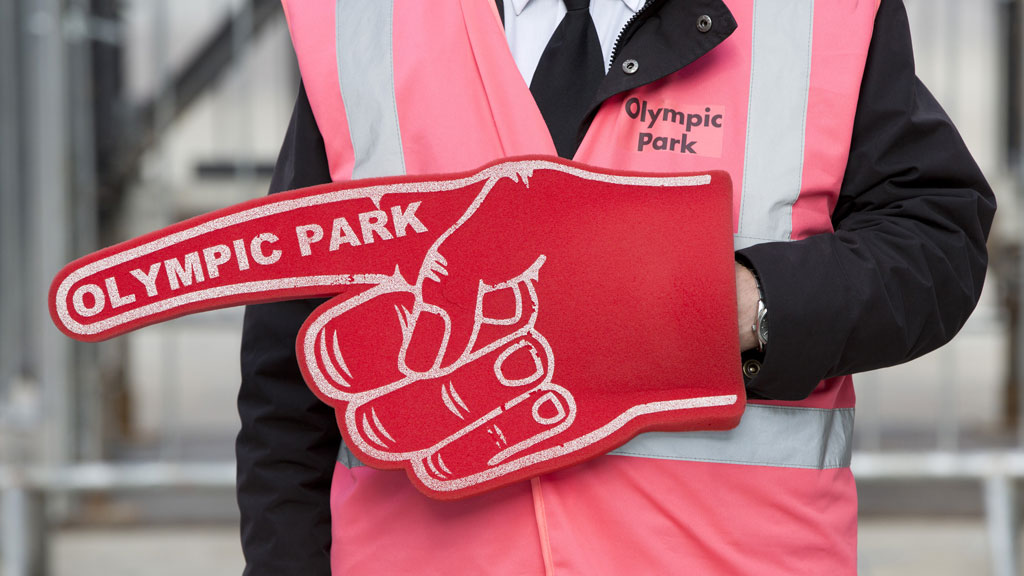For the London 2012 Games makers, it is forever Games Time
The purple outfits are being folded away, the giant sponge fingers consigned to storage. But what was it like for the 70,000 volunteers who made the London 2012 experience quite so special?

There were almost a quarter of a million applicants, whittled down to seventy thousand after a series of interviews. They gave up their time, found their own accommodation, went through a million hours of training between them to drive cars, carry out first aid, and point directions with relentlessly cheerful zeal.
For a few heady weeks in the summer of 2012, London was treated to the sight of people smiling, being helpful; even friendly. Now, with the finale of the Paralympics about to bring the formal sporting events to a close, can the legacy of this communitarian spirit be preserved?
Almost half of the Games makers said they had never volunteered before, but were inspired to continue after their experience: paying tribute to their contribution, London mayor Boris Johnson talked of a “crop duster of seratonin” and said how important it was “to keep the energy in the volunteering life of the city.”
The Join In Trust, a charity that encourages people to get involved with local sports facilities, is getting a £2 million boost from the Government over the next year, in an effort to keep up the momentum.
The 2012 experience
But what was it like, for those thousands who donned the special khaki trousers and purple jackets, who gave so freely of their time, to be part of such a historic moment ? We spoke to one Games maker, who prefered to remain anonymous, about her experience.
“I’m female, middle class, university educated, and volunteer elsewhere, but my impression was there were a lot of people who weren’t like me. The volunteer who interviewed me was a firefighter from the East End, covered in tatoos, who had never carried out an interview before: next in line was a rich looking retired man in beige slacks and a blue blazer.
It was like the usual keep-to-yourself Londonness was suspended, and everyone joined in a collective state of euphoria. London 2012 Games maker
Another guy who sat next to me in the first training session was a shy IT worker from Luton who had never done anything like this before: the very talkative lady who gave me my kit came to the UK from Poland three years ago.
By all accounts the job I ended up with was a pretty jammy one. I was an assistant to a member of the Olympic family and their guest. That means someone from one of the national committees, a sponsor, international sports federation, but I won’t say who it was because I don’t think it would make me a very good host.
In any case, the job involved sorting out their advance schedules, arranging transport and then escorting them from their hotel to the Olympic venues. When they were watching an actual event, we were meant to go to the workforce lounge, where there was food, other Games makers to chat to, and television screens showing the sport.
But the open design of many venues meant I often ended up watching the live action. My guests were great, really interesting to talk to and learn about their country: they were also grateful to be in London and getting all this help.
Beckham and Kissinger
I even brushed – very briefly – with David Beckham, who was followed (bizarrely and surreally) by Henry Kissinger in a corridor while I waited for my guest after an event.
It was often tiring, and the days could be very long: despite what they told us at training, I sometimes worked much longer than my allocated shift and because I didn’t always make food a priority, I often got hungry. With no specific base, I missed out on the cameraderie of morning meetings and making friends for life, but I have no complaints: it was amazing.
In fact it was an amazing experience for everyone I spoke to, on the tube, in workforce lounges, spectators, tourists, officials, Londoners with or without tickets – all so, so lovely. It was like the usual keep-to-yourself Londonness was suspended, and everyone joined in a collective state of euphoria.
Waiting for the bus at 2am after the Closing Ceremony three German boys asked me for directions, and then proceeded to thank me with a group hug. On the bus, I was greeted with a standing ovation, which I accepted on behalf of all the Games makers.
Will I volunteer again? Of course I will. And Locog are doing well in keeping in touch with us, offering spaces at the final Games parade, discounts on merchandise and so-on. There’s even a chance to get a qualification in customer services for anyone who wants to.
I hope it will have a lasting effect. On my part, I’ve decided to continue with my UnLondonish behaviour and am proactively offering help to hapless tourists staring at maps on the tube and searching for the right direction on street corners.”